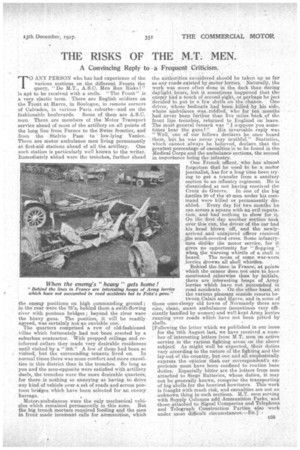THE RISKS OF THE M.T. MEN.
Page 21

If you've noticed an error in this article please click here to report it so we can fix it.
A Convincing Reply to -a Frequent Criticism.
TO ANY PERSON who has had experience of the various sections on the different Fronts the query, "Do M.T., A.S.C. Men Run Risks? " is apt to be received with a smile. " The Front" is a very elastic term. There are English soldiers on the Tront at Havre, in Boulogne, in remote corners of Calvados, in various Paris suburbs—and on the fashionable boulevards. Some of them are A.S.C. men. There are members of the Motor Transport service ahead of most of the artillery on all points of the long line from Fumes to the Swiss frontier, and from the &civic, Pass to ' low-lying Venice. There are motor ambulance men living permanently at first-aid stations ahead of all the artillery. One such station is particularly well known to the writer. Immediately ahead were the trenches, further ahead
the enemy positions on high commanding ground ; in the rear were the 75s, behind them a swift-flowing river with pontoon bridges ; beyond the river were the heavy guns. The position, it will be readily agreed, was certainly not an enviable one:
The quarters comprised a row of old-fashioned villas which fortunately had not been erected by a suburban centimeter. With propped ceilings an& reinforced cellars they made very desirable residences until visited by a "305." A few of them had been so visited, but the surrounding tenants lived on. In normal times there was more comfort and more casualties in this district than in the trenches. So long as you and the men,opposite were satisfied with artillery duels, the trenches were the more desirable quarters, for there is nothing so annoying as having to drive any kind of vehicle over a sit of roads and across pontoon bridges which have been selected for an enemy
barrage. • Motorkambulanees were the only mechanical vehicles which remained permanently in this zone. But the big trench mortars required feeding and the men in front made inceSsant calls for ammunition, whie.N.
the authoritiesCoaSidered. should be taken up as far as any roads existed by motorlorries.. Naturally, the work was more often done in the dark than during jclaYlight hours, but it sometimes happened that the enemy had a totich of second eight, or perhaps he just "decided to put in a few shells on the .chance. One -driver, whose" bedinate had been killed by/his side, whose ambulanee Was .riddled, who for ten months had never been. further than five miles back of the .front line trenches, -returned to England on leave. The most general l'ernark was " I suppose you some tithes hear the guns? His invariable reply was ." Well; 'one of our fellows .declares he once heard them, but he was never .very truthful" Statistics, which cannot always be 'believed, declare that the _greatest percentage of casualties is to be found in the
• Medical Corps and the ambulance sections, the second in importance being the infantry.
One French officer, • who has • almost forgotten that he used to be a motor journalist, has for a long time been trying to get a transfer from a sanitary section to an infantry regiment. He is
• dissatisfied at not having received the Croix de Guorre. In one of the big .battles 20 of the men under his command were killed or permanently diaabled. Every day for two months he ran across a square with an evil reputation, and had nothing to show for it. On the first clay another section took over this run, the driver of the car had his head blown off, and the newlyarrived and uninjured officer received the much-coveted cross. Some infantrymen dislike the motor service, fort it gives no opportunity for "flopping ", when the warning whistle of a, shell is heard. The noise. of some war-worn ,lorries drowns all shell whistles.
Behind the lines in France, at poiniis which the censor does not care to have mentioned otherwise than by initials, there are interesting heaps of Army lorries which have not succumbed in road accidents. On the other hand, at the various pleasant seaside resorts be tween Calais and Havre, and in some of those once-sleepy old towns of Normandy there are nice, clean, smart ambulances (sometimes very efficiently handled by women) and well-kept Army lorries "running over roads which have not been pitted by shells. • [Following the :letter which we published in our issue for the 16th August, last, we have received a num: ber of interesting letters from M.T. men an active service in the various fighting areas on the above subject'. As might well be expected, their duties vary according to the nature of the fighting and the lay-out of the country, but one and all emphatically express the opinion that our correspondent's experience must have been confined to. routine base duties. Especially bitter are the letters from men attached to Siege Batteries, whose duties, it may not be generally known, comprise the transporting of big shells for the heaviest howitzers. This work is fraught with much risk, and casualties are not an .unknown thing in such Sections. M.T. men serving with Supply Columns add Ammunition Parks, and those attached to Signal Companies and Telephone and Telegraph Construction Parties also work under most difficult eircurnetances.—En.]


























